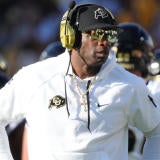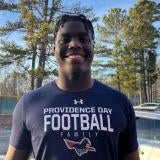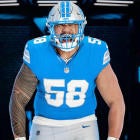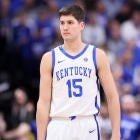BIRMINGHAM, Ala. -- The University of Alabama at Birmingham decided to end its football program before the 2014 season began and used a public relations firm to mislead the community about the purpose of a report studying the athletics department, an Alabama politician said Monday.
Alabama state Rep. Jack Williams called on UAB president Ray Watts to resign, University of Alabama System chancellor Robert Witt to clarify his role in the “deception,” and Gov. Robert Bentley to work with the state legislature for reform.
A week after introducing three bills in the Alabama House of Representatives to restore football and restructure the system’s board of trustees, Williams released documents showing the lengths by which New York public relations firm Sard Verbinnen & Co. prepared the university to drop football last September.
On Dec. 2, 2014, UAB became the first university in almost two decades to cut major college football and received immediate blowback from the community for a lack of transparency. The university cited financial numbers from consultant Bill Carr (that have since been challenged) as well as the need to invest at least $49 million over five years to keep football competitive as primary reasons for ending the program.
Williams, a UAB supporter, said in a statement that Watts on “numerous occasions told the media, local business, UAB Faculty Senate and political leaders that a study was underway and no decisions had been made on the future of football and would not be made until the ‘data driven’ study was complete.” Internal UAB documents show the university initially planned to announce the findings of its athletic review on Sept. 17, 2014.
Minutes from a meeting on Nov. 5 show Watts told UAB's faculty senate not to "pay heed to rumors" about football being dropped. He added, "No decisions have been made yet as the department has just begun their process." In reality, plans had been in the works for a while.
One document produced by Sard Verbinnen and labeled "confidential draft" includes a thorough schedule of how UAB would roll out the decision to cut sports on Sept. 17. Football coach Bill Clark was to be notified a day earlier. In the early morning of Sept. 17, Watts was scheduled to host a conference call with the full board. Later in the morning, the document says "notify assistant football coaches and coaches of other cut teams (i.e. bowling/rifle) during in-person pre-scheduled coaches meetings."
Also included in the documents released by Williams is a draft of the Carr report dated Sept. 3. The draft appears to be nearly the same document dated two months later that Watts said he relied upon to end football.
In a Sept. 5 memo to UAB spokesman Jim Bakken, Sard Verbinnen laid out a plan that the university essentially later followed in announcing that the sports of football, bowling and rifle had been dropped, including banking on media coverage that would sympathize with UAB due to increasing NCAA-related costs. Sard Verbinnen was described by Bloomberg.com in 2013 as Wall Street's "go-to crisis PR firm."
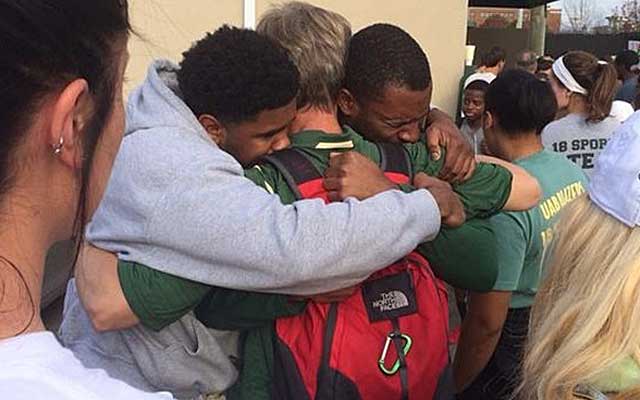
“Given the ever changing NCAA landscape, the possibility that other programs are cancelled following the 2014/2015 season is high,” Sard Verbinnen wrote in its memo. “News coverage has already begun around potential changes to collegiate program[s], including Hawaii and others, which will likely take the heat off UAB and serve as a good media distraction post-season. Moreover, having to cancel a potentially winning team’s program further demonstrates that it is the system that is broken, not UAB’s management.”
Documents show UAB initially considered a midseason announcement that football would be canceled. But Sard Verbinnen and Carr opposed that period in order to minimize the potential impact on athletes, backlash against the school and financial consequences for UAB.
“UAB has contractual obligations to Conference USA and the coaching staff to compete in the 2014-15 season,” Sard Verbinnen wrote. “A September/October announcement could result in a critical mass of immediate transfer requests (estimated to be at least 20-25 of the team’s top players), where students refuse to finish out the season as they seek to regain the year of eligibility, or a full team boycott. If not effectively managed, it is conceivable that UAB would not be able to field a competitive team -- or any team.”
Carr wrote a letter to Bakken on Sept. 5 that said, in part, that there is “no ideal time to reveal such disruptive news” if UAB decided to cut sports. Since a significant number of athletes might choose not to continue playing and seek relief for NCAA eligibility, "CarrSports recommends that notification be delivered as soon as possible after conclusion of football's regular season," Carr wrote.
Watts’ first public statement about possibly cutting football came Nov. 6 when he said, in part, that it would be “counterproductive and inappropriate to speculate on outcomes based on an incomplete process.” At a Dec. 2 news conference, Watts declined to identify when he made the decision to cut the three sports. Watts said he made Clark aware during his interview process before the 2014 season that “all options” were possible based on the results of Carr’s review.
UAB released a statement Monday that said: "At UAB, as with any major organization, it is common to prepare for potential scenarios from a communications standpoint, even prior to a final decision being made. These documents are consistent with such a process. The decision was final in November after all information was garnered and analyzed." Added Bakken: "While proactive communications were drafted based on a potential scenario and timing, additional deliberation and review was necessary for a final decision that was eventually made in November."
Later Monday afternoon, Watts released a statement saying it was "categorically untrue" the UAB football decision was made prior to the 2014 season. "We conducted a specific review of the football program and the budget, based on known expenses," Watts said. "With information in hand, I began the decision-making process. I made that final decision in November and felt it was appropriate to wait until after the regular season to tell the team and the UAB family."
Witt, the Alabama chancellor, again expressed support for Watts on Monday. Witt said in a statement that only a "vocal few" disagree with the system's governance structure.
"In the last decade, UAB has supplemented the athletics budget by $140 million," Witt said. "It would cost many millions more than UAB was already spending to field a competitive football program in the new era of NCAA governance. Those millions would have to come from somewhere. President Watts concluded that taking money from UAB's other valuable endeavors, including critical health care and life-saving research, is not the answer. I agree."
CBSSports.com had previously requested from UAB "all documents consultant Bill Carr delivered to UAB regarding the evaluation of the football program's future." UAB fulfilled the request in late December but did not provide Carr's Sept. 3 memo to Bakken or Carr's Sept. 3 draft report.
When asked Monday why those documents weren't provided to CBSSports.com, Bakken wrote via email that "the final report and final worksheets, as well as contracts and invoices were provided. We do not believe the draft report or deliberative correspondence are responsive documents pursuant to the Alabama Open Records Act."
PR firm: Don't announce end of football near board meeting
Before and after football was cut, UAB administrators identified Carr’s report as the driving factor for the decision, although Carr never made a public recommendation on which direction to go. Watts had talked about the need for a data-driven study from Carr that would yield a decision.
But in an undated internal document titled “Athletic Department Announcement Q&A,” the question is asked who was involved in making the decision. The response: “The UAB administration and athletics department leadership agreed that this is the best decision for UAB and the future of UAB athletics. UAB also consulted highly knowledgable outside experts and advisors from CarrSports Consulting to validate our analysis and inform our planning.”
The Q&A document, which was labeled “confidential draft” and for internal use only, also left blank the date when UAB made the decision. “We received a final report on this issue from CarrSports consulting in [month] — and with NCAA developments ongoing, we have been evaluating the landscape as regulatory changes occur.”
CBSSports.com found several discrepancies in the report produced by Carr, including a basic calculation error that didn’t count $645,000 over a five-year period in projected football donations. UAB acknowledged the mistake and said it wasn’t relevant to the final decision.
The report also showed no proposed financial model for the athletics department if UAB cannot stay in C-USA, a different way of allocating donations to football than what’s reported to the NCAA, and no consideration into how dropping football might impact the university as a whole. UAB has had a campus-wide review of its long-term goals for more than a year.
Carr’s report showed UAB changed course with the athletic study in April 2014. At a news conference in January 2015, Watts declined to say who directed Carr to consider killing football.
At that news conference, on the eve of UAB’s faculty senate voting no confidence in Watts, the president announced a task force to select an “independent” firm to review Carr’s work. The task force recently voted unanimously to hire the firm OSKR, but UAB abruptly pulled the plug a week later and said OSKR was biased given its co-founder’s published articles on the subject.
Sard Verbinnen, the New York PR firm, advised UAB in September to “allow other tough decisions to set the stage” to announce the review’s results. For instance, the university announced last June that UAB Medicine Employees would not receive annual merit raises based on “profound shifts in healthcare.”
Sard Verbinnen advised UAB that “further isolating the athletic department’s results from others announced earlier in the season will also lessen the chances that the UAB lumps all ‘tough decisions’ together and concludes that the university is in financial duress.”
Also, Sard Verbinnen advised to wait until after the University of Alabama’s Board of Trustees meeting in November to help mitigate “unwarranted speculation” that the decision was driven by the board. Many UAB supporters believe several powerful trustees with Crimson Tide ties, including Paul Bryant Jr., got football killed. The board oversees UAB.
“The strategic review required time and careful deliberation by the department and the community’s perception of it should not be compromised by the negative optics that could result if it were communicated in parallel with a Board of Trustee meeting,” Sard Verbinnen wrote.
Williams, who is the publisher of a UAB sports web site affiliated with Rivals.com, called on Alabama’s board to eliminate its athletic committee, which must approve major financial decisions related to UAB athletics.
“Were the members of the Committee not Board members they would meet the NCAA definition of a booster for the University of Alabama,” Williams said. “The arrangement on the UA System Board is the only instance in NCAA Division 1 athletics where the boosters of one school have complete control over the athletic program of another Division 1 program. This committee has worked against the best interest of UAB athletics for many years and this practice must stop immediately.”
Perhaps the saddest document released was one that appears to be a draft of UAB answering questions for players under the assumption football would get cut in September. The document said that UAB winning the rest of its games wouldn't change the decision, and UAB planned to accentuate the positives of killing the sport.
“Make History, Show Your Heart,” the document said. “This will be a difficult transition, but it will demonstrate your ability to deal with hard times and show heart, work ethic, loyalty and dedication. These are traits to be proud of and this is a story you will be able to share and benefit from in every job interview for the rest of your life. Take this opportunity to prove your ability to deal with a difficult situation and to help others through the same — something employers look for.”








